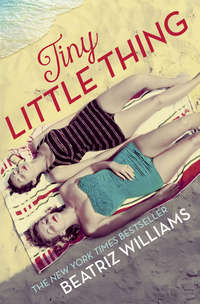
Полная версия
Along the Infinite Sea: Love, friendship and heartbreak, the perfect summer read



Copyright
Published by HarperCollinsPublishers Ltd
1 London Bridge Street
London, SE1 9GF
www.harpercollins.co.uk
First published by Penguin Group USA 2015
First published in the UK by Harper 2015
Copyright © Beatriz Williams
Cover layout design © HarperCollinPublishers Ltd 2015Cover photograph courtesy of the F.C. Gundlach Foundation (Two Women on the Beach, 1936. By Yva / Else Neuländer).
All other photographs by Cherie Chapman, (sea and sky). Cover texture © CGTextures (wood).
Beatriz Williams asserts the moral right to be identified as the author of this work.
A catalogue copy of this book is available from the British Library.
This novel is entirely a work of fiction. The names, characters and incidents portrayed in it are the work of the author’s imagination. Any resemblance to actual persons, living or dead, events or localities is entirely coincidental.
All rights reserved under International and Pan-American Copyright Conventions. By payment of the required fees, you have been granted the non-exclusive, non-transferable right to access and read the text of this e-book on screen. No part of this text may be reproduced, transmitted, down-loaded, decompiled, reverse engineered, or stored in or introduced into any information storage and retrieval system, in any form or by any means, whether electronic or mechanical, now known or hereinafter invented, without the express written permission of HarperCollins.
Source ISBN: 9780008134952
Ebook Edition © November 2015 ISBN: 9780008134969
Version 2015-09-09
Dedication
To those who escaped in time
and those who did not
and those who risked their lives to help
Table of Contents
Cover
Title Page
Copyright
Dedication
Overture
Annabelle
First Movement
Pepper
Annabelle
Pepper
Annabelle
Pepper
Annabelle
Pepper
Annabelle
Second Movement
Annabelle
Pepper
Annabelle
Pepper
Annabelle
Intermezzo
Annabelle
Third Movement
Annabelle
Pepper
Annabelle
Pepper
Fourth Movement
Annabelle
Pepper
Annabelle
Pepper
Annabelle
Pepper
Annabelle
Fifth Movement
Pepper
Annabelle
Coda
Stefan
Historical Note
Note on the Cover, From the Publisher
Acknowledgments
Keep Reading
By the Same Author
About the Author
About the Publisher
Overture
“To see all without looking;
to hear all without listening.”
CÉSAR RITZ
King of Hoteliers, Hotelier of Kings
ANNABELLE
Paris • 1937
All you really need to know about the Paris Ritz is this: by the middle of 1937, Coco Chanel was living in a handsome suite on the third floor, and the bartender—an intuitive mixologist named Frank Meier—had invented the Bloody Mary sixteen summers earlier to cure a Hemingway hangover.
Mind you, when I arrived at Nick Greenwald’s farewell party on that hot July night, I wasn’t altogether aware of this history. I didn’t run with the Ritz crowd. Mosquitoes, my husband called them. And maybe I should have listened to my husband. Maybe no good could come from visiting the bar at the Paris Ritz; maybe you were doomed to commit some frivolous and irresponsible act, maybe you were doomed to hover around dangerously until you had drawn the blood from another human being or else had your own blood drawn instead.
But Johann—my husband—wasn’t around that night. I tiptoed in through the unfashionable Place Vendôme entrance on my brother’s arm instead, since Johann had been recalled to Berlin for an assignment of a few months that had stretched into several. In those days, you couldn’t just flit back and forth between Paris and Berlin, any more than you could flit between heaven and hell; and furthermore, why would you want to? Paris had everything I needed, everything I loved, and Berlin in 1937 was no place for a liberal-minded woman nurturing a young child and an impossible rift in her marriage. I stayed defiantly in France, where you could still attend a party for a man named Greenwald, where anyone could dine where he pleased and shop and bank where he pleased, where you could sleep with anyone who suited you, and it wasn’t a crime.
For the sake of everyone’s good time, I suppose it was just as well that my husband remained in Berlin, since Nick Greenwald and Johann von Kleist weren’t what you’d call bosom friends, for all the obvious reasons. But Nick and I were a different story. Nick and I understood each other: first, because we were both Americans living in Paris, and second, because we shared a little secret together, the kind of secret you could never, ever share with anyone else. Of all my brother’s friends, Nick was the only one who didn’t resent me for marrying a general in the German army. Good old Nick. He knew I’d had my reasons.
The salon was hot, and Nick was in his shirtsleeves, though he still retained his waistcoat and a neat white bow tie, the kind you needed a valet to arrange properly. He turned at the sound of my voice. “Annabelle! Here at last.”
“Not so very late, am I?” I said.
We kissed, and he and Charles shook hands. Not that Charles paid the transaction much attention; he was transfixed by the black-haired beauty who lounged at Nick’s side in a shimmering silver-blue dress that matched her eyes. A long cigarette dangled from her fingers. Nick turned to her and placed his hand at the small of her back. “Annabelle, Charlie. I don’t think you’ve met Budgie Byrne. An old college friend.”
We said enchantée. Miss Byrne took little notice. Her handshake was slender and lacked conviction. She slipped her arm through Nick’s and whispered in his ear, and they shimmered off together to the bar inside a haze of expensive perfume. The back of Miss Byrne’s dress swooped down almost to the point of no return, and her naked skin was like a spill of milk, kept from running over the edge by Nick’s large palm.
Charles covered his cheek with his right hand—the same hand that Miss Byrne had just touched with her limp and slender fingers—and said that bastard always got the best-looking women.
I watched Nick’s back disappear into the crowd, and I was about to tell Charles that he didn’t need to worry, that Nick didn’t really look all that happy with his companion and Charles might want to give the delectably disinterested Miss Byrne another try in an hour, but at that exact instant a voice came over my shoulder, the last voice I expected to hear at the Paris Ritz on this night in the smoldering middle of July.
“My God,” it said, a little slurry. “If it isn’t the baroness herself.”
I thought perhaps I was hallucinating, or mistaken. It wouldn’t be the first time. For the past two years, I’d heard this voice everywhere: department stores and elevators and street corners. I’d seen its owner in every possible nook, in every conceivable disguise, only to discover that the supposed encounter was only a false alarm, a collision of deluded molecules inside my own head, and the proximate cause of the leap in my blood proved to be an ordinary citizen after all. Just an everyday fellow who happened to have dark hair or a deep voice or a certain shape to the back of his neck. In the instant of revelation, I never knew whether to be relieved or disappointed. Whether to lament or hallelujah. Either way, the experience wasn’t a pleasant one, at least not in the way we ordinarily experience pleasure, as a benevolent thing that massages the nerves into a sensation of well-being.
Either way, I had committed a kind of adultery of the heart, hadn’t I, and since I couldn’t bear the thought of adultery in any form, I learned to ignore the false alarm when it rang and rang and rang. Like the good wife I was, I learned to maintain my poise during these moments of intense delusion.
So there. Instead of bolting at the slurry word baroness, I took my deluded molecules in hand and said: Surely not.
Instead of spinning like a top, I turned like a figurine on a music box, in such a way that you could almost hear the tinkling Tchaikovsky in my gears.
A man came into view, quite lifelike, quite familiar, tall and just so in his formal blacks and white points, dark hair curling into his forehead the way your lover’s hair does in your wilder dreams. He was holding a lowball glass and a brown Turkish cigarette in his right hand, and he took in everything at a glance: my jewels, my extravagant dress, the exact state of my circulation.
In short, he seemed an awful lot like the genuine article.
“There you are, you old bastard,” said Charles happily, and sacré bleu, I realized then what I already knew, that the man before me was no delusion. That the Paris Ritz was the kind of place that could conjure up anyone it wanted.
“Stefan,” I said. “What a lovely surprise.”
(And the big trouble was, I think I meant it.)
First Movement
“Experience is simply the name
we give our mistakes.”
OSCAR WILDE
PEPPER
Palm Beach • 1966
1.
The Mercedes-Benz poses on the grass like a swirl of vintage black ink, like no other car in the world.
You’d never guess it to look at her, but Miss Pepper Schuyler—that woman right over there, the socialite with the golden antelope legs who’s soaking up the Florida sunshine at the other end of the courtyard—knows every glamorous inch of this 1936 Special Roadster shadowing the grass. You might regard Pepper’s pregnant belly protruding from her green Lilly shift (well, it’s hard to ignore a belly like that, isn’t it?) and the pastel Jack Rogers sandal dangling from her uppermost toe, and you think you have her pegged. Admit it! Lush young woman exudes Palm Beach class: What the hell does she know about cars?
Well, beautiful Pepper doesn’t give a damn what you think about her. She never did. She’s thinking about the car. She slides her gaze along the seductive S-curve of the right side fender, swooping from the top of the tire to the running board below the door, like a woman’s voluptuously naked leg, and her heart beats a quarter-inch faster.
She remembers what a pain in the pert old derrière it was to repaint that glossy fender. It had been the first week of October, and the warm weather wouldn’t quit. The old shed on Cape Cod stank of paint and grease, a peculiarly acrid reek that had crept right through the protective mask and into her sinuses and taken up residence, until she couldn’t smell anything else, and she thought, What the hell am I doing here? What the hell am I thinking?
Thank God that was all over. Thank God this rare inky-black 1936 Mercedes Special Roadster is now someone else’s problem, someone willing to pay Pepper three hundred thousand dollars for the privilege of keeping its body and chrome intact against the ravages of time.
The deposit has already been paid, into a special account Pepper set up in her own name. (Her own name, her own money: now, that was a glorious feeling, like setting off for Europe on an ocean liner with nothing but open blue seas ahead.) The rest will be delivered today, to the Breakers hotel where Pepper is staying, in a special-delivery envelope. Another delightful little big check made out in Pepper’s name. Taken together, those checks will solve all her problems. She’ll have money for the baby, money to start everything over, money to ignore whoever needs ignoring, money to disappear if she needs to, forever and ever. She’ll depend on no one. She can do whatever the hell she pleases, whatever suits Pepper Schuyler and—by corollary—Pepper Junior. She will toe nobody’s line. She will fear nobody.
So the only question left in Pepper’s mind, the only question that needs resolving, is the niggling Who?
Who the hell is this anonymous buyer—a woman, Pepper’s auction agent said—who has the dough and the desire to lay claim to Pepper’s very special Special Roadster, before it even reaches the public sales ring?
Not that Pepper cares who she is. Pepper just cares who she isn’t. As long as this woman is a disinterested party, a person who has her own reasons for wanting this car, nothing to do with Pepper, nothing to do with the second half of the magic equation inside Pepper’s belly, well, everything’s just peachy keen, isn’t it? Pepper will march off with her three hundred thousand dollars and never give the buyer another thought.
Pepper lifts a tanned arm and checks her watch. It’s a gold Cartier, given to her by her father for her eighteenth birthday, perhaps as a subtle reminder to start arriving the hell on time, now that she was a grown-up. It didn’t work. The party always starts when Pepper gets there, not before, so why should she care if she arrives late or early? Still, the watch has its uses. The watch tells her it’s twenty-seven minutes past twelve o’clock. They should be here any moment: Pepper’s auction agent and the buyer, to inspect the car and complete the formalities. If they’re on time, and why wouldn’t they be? By all accounts, the lady’s as eager to buy as Pepper is to sell.
Pepper tilts her head back and closes her eyes to the white sun. She can’t get enough of it. This baby inside her must have sprung from another religion, one that worshipped the gods in the sky or gained nourishment from sunbeams. Pepper can almost feel the cells dividing in ecstasy as she points herself due upward. She can almost feel the seams strain along her green Lilly shift, the dancing monkeys stretch their arms to fit around the ambitious creature within.
Well, that makes sense, doesn’t it? Like father, like child.
“Good afternoon.”
Pepper bolts upright. A small and slender woman stands before her, dark-haired, dressed in navy Capri pants and a white shirt, her delicate face hidden by a pair of large dark sunglasses. It’s Audrey Hepburn, or else her well-groomed Florida cousin.
“Good afternoon,” Pepper says.
The woman holds out her hand. “You must be Miss. Schuyler. My name is Annabelle Dommerich. I’m the buyer. Please, don’t get up.”
Pepper rises anyway and takes the woman’s hand. Mrs. Dommerich stands only a few inches above five feet, and Pepper is a tall girl, but for some reason they seem to meet as equals.
“I’m surprised to see you,” says Pepper. “I had the impression you wanted to remain anonymous.”
Mrs. Dommerich shrugs. “Oh, that’s just for the newspapers. Actually, I’ve been hugely curious to meet you, Miss Schuyler. You’re even more beautiful than your pictures. And look at you, blooming like a rose! When are you due?”
“February.”
“I’ve always envied women like you. When I was pregnant, I looked like a beach ball with feet.”
“I can’t imagine that.”
“It was a long time ago.” Mrs. Dommerich takes off her sunglasses to reveal a pair of large and chocolaty eyes. “The car looks beautiful.”
“Thank you. I had an expert helping me restore it.”
“You restored it yourself?” Both eyebrows rise, so elegant. “I’m impressed.”
“There was nothing else to do.”
Mrs. Dommerich turns to gaze at the car, shielding her brows with one hand. “And you found it in the shed on Cape Cod? Just like that, covered with dust? Untouched?”
“Yes. My sister-in-law’s house. It seemed to have been abandoned there.”
“Yes,” says Mrs. Dommerich. “It was.”
The grass prickles Pepper’s feet through the gaps in her sandals. Next to her, Mrs. Dommerich stands perfectly still, like she’s posing for a portrait, Woman Transfixed in a Crisp White Shirt. She talks like an American, in easy sentences, but there’s just the slightest mysterious tilt to her accent that suggests something imported, like the Chanel perfume that colors the air next to her skin. Though that skin is remarkably fresh, lit by a kind of iridescent pearl-like substance that most women spend fruitless dollars to achieve, Pepper guesses she must be in her forties, even her late forties. It’s something about her expression and her carriage, something that makes Pepper feel like an ungainly young colt, dressed like a little girl. Even considering that matronly bump that interrupts the youthful line of her figure.
At the opposite end of the courtyard, a pair of sweating men appear, dressed in businesslike wool suits above a pair of perfectly matched potbellies, neat as basketballs. One of them spots the two women and raises his hand in what Pepper’s always called a golf wave.
“There they are,” says Mrs. Dommerich. She turns back to Pepper and smiles. “I do appreciate your taking such trouble to restore her so well. How does she run?”
“Like a racehorse.”
“Good. I can almost hear that roar in my ears now. There’s no other sound like it, is there? Not like anything they make today.”
“I wouldn’t know, really. I’m not what you’d call an enthusiast.”
“Really? We’ll have to change that, then. I’ll pick you up from your hotel at seven o’clock and we’ll take her for a spin before dinner.” She holds out her hand, and Pepper, astonished, can do nothing but shake it. Mrs. Dommerich’s fingers are soft and strong and devoid of rings, except for a single gold band on the telling digit of her left hand, which Pepper has already noticed.
“Of course,” Pepper mumbles.
Mrs. Dommerich slides her sunglasses back in place and turns away.
“Wait just a moment,” says Pepper.
“Yes?”
“I’m just curious, Mrs. Dommerich. How do you already know how the engine sounds? Since it’s been locked away in an old shed all these years.”
“Oh, trust me, Miss Schuyler. I know everything about that car.”
There’s something so self-assured about her words, Pepper’s skin begins to itch, and not just the skin that stretches around the baby. The sensation sets off a chain reaction of alarm along the pathways of Pepper’s nerves: the dingling of tiny alarm bells in her ears, the tingling in the tip of her nose.
“And just how the hell do you know that, Mrs. Dommerich? If you don’t mind me asking. Why exactly would you pay all that money for this hunk of pretty metal?”
Mrs. Dommerich’s face is hidden behind those sunglasses, betraying not an ounce of visible reaction to Pepper’s impertinence. “Because, Miss Schuyler,” she says softly, “twenty-eight years ago, I drove for my life across the German border inside that car, and I left a piece of my heart inside her. And now I think it’s time to bring her home. Don’t you?” She turns away again, and as she walks across the grass, she says, over her shoulder, sounding like an elegant half-European mother: “Wear a cardigan, Miss Schuyler. It’s supposed to be cooler tonight, and I’d like to put the top down.”
2.
At first, Pepper has no intention of obeying the summons of Annabelle Dommerich. The check is waiting for her when she calls at the front desk at the hotel, along with a handwritten telephone message that she discards after a single glance. She has the doorman call her a taxi, and she rides into town to deposit the check in her account. The clerk’s face is expressionless as he hands her the receipt. She withdraws a couple hundred bucks, which she tucks into her pocketbook next to her compact and her cigarettes. When she returns to the hotel, she draws herself a bubble bath and soaks for an hour, sipping from a single glass of congratulatory champagne and staring at the tiny movements disturbing the golden curve of her belly. Thank God she hasn’t got any stretch marks. Coconut oil, that’s what her doctor recommended, and she went out and bought five bottles.
The water turns cool. Pepper lifts her body from the tub and wraps herself in a white towel. She orders a late room-service lunch and stands on the balcony, wrapped in her towel, smoking a cigarette. She considers another glass of champagne but knows she won’t go through with it. The doctor back on Cape Cod, a comely young fellow full of newfangled ideas, said to go easy on the booze. The doctor also said to go easy on the smokes, but you can’t do everything your doctor says, can you? You can’t give up everything, all at once, when you have already given up so much.
And for what? For a baby. His baby, of all things. So stupid, Pepper. You thought you were so clever and brave, you thought you had it all under control, and now look at you. All knocked up and nowhere to go.
The beach is bright yellow and studded with sunbathers before a lazy surf. Pepper reaches to tuck in her towel and lets it fall to the tiled floor of the balcony. No one sees her. She leans against the balcony rail, naked and golden-ripe, until her cigarette burns to a tiny stump in her hand, until the bell rings with her room-service lunch.
After she eats, she sets the tray outside her door and falls into bed. She takes a long nap, over the covers, and when she wakes up she slips into a sleeveless tunic-style cocktail dress, brushes her hair, and touches up her lipstick. Before she heads for the elevator, she takes a cardigan from the drawer and slings it over her bare shoulders.
3.
But the elevator’s stuck in the lobby. That was the trouble with hotels like the Breakers; there was always some Greek tycoon moving in, some sausage king from Chicago, and the whole place ground to a halt to accommodate his wife and kids and help and eighty-eight pieces of luggage. Afterward, he would tell his friends back home that the place wasn’t what it was cracked up to be, and the natives sure were unfriendly.
Pepper taps her foot and checks her watch, but the elevator is having none of it. She heads for the stairs.






